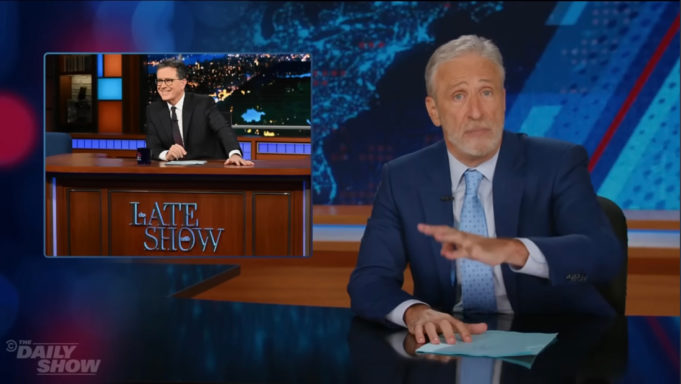Change is inevitable, especially with people’s media-viewing tastes and habits, but we seem to live in a weird time, when time itself no longer matters.
Late-night network television has had to contend with this phenomenon more than any other TV genre. Streaming services, including YouTube, Paramount+, Disney+, Hulu, and social media platforms, allow viewers to watch their favorite parts of their favorite late-night shows anytime they want. You don’t have to stay up late to watch your favorite late-night shows anymore.
I’m guilty of the same viewing habit. Every late-night show I watch regularly is in bits and pieces on my phone or computer. Daily shows like The Late Show with Stephen Colbert, Jimmy Kimmel Live!, and The Daily Show regularly post their hosts’ news monologues on YouTube just before airing each new episode. The rest of the nightly comedy segments, celebrity interviews, and musical performances pop up on YouTube and social media the following morning, just in time for my morning coffee. Even long-running Saturday Night Live posts nearly every portion of its weekend sketch show in separate chunks on YouTube.
This rising trend in viewing has pulled some viewers away from their televisions, but YouTube views aren’t empty calories for late-night shows’ Nielsen ratings. Nielsen measures who’s watching what on TV, cable, and online channels with its Total Audience Measurement data system. Even if literal TV viewing has dropped because of the internet, it’s still factored into ratings.
Still, streaming as a whole is clobbering its competition. As of July, a little more than 47% of adult viewers spent most of their time watching streaming services, according to Nielsen. Meanwhile, just 22% mostly watch cable, and 18% mostly watch broadcast or network television, including recorded shows on DVRs and TiVos. (Yes, they still exist.)
Now we find ourselves in a timeline where late-night network shows and maybe even cable late-night shows could be canceled without replacements. Late-night host-turned-hit podcaster Conan O’Brien, who returned to TV last year with HBO Max’s comedy travel show Conan O’Brien Must Go, said during his induction speech to the Television Academy Hall of Fame that late-night TV “as we have known it since around 1950 is going to disappear, but those voices are not going anywhere.”
First, CBS decided not to renew its late-night panel show @After Midnight when host Taylor Tomlinson chose to leave the podium last year after building a sizable and younger following with her charm and wit and a crack writing staff led by comedian Jo Firestone.
Then, the unthinkable happened. Stephen Colbert announced last month that the network not only decided to cancel his Late Show but to kill its entire late-night schedule.
CBS won a massive bidding war in the 1990s to build its late-night timeslot, starting with The Late Show’s David Letterman in 1993. Letterman lengthened CBS’s late-night shelf by hiring Tom Snyder the following year to host the new Late Late Show, a timeslot that would turn from one-on-one conversations to late-night comedy starting with Craig Kilborn in 1999, followed by the brilliant Craig Ferguson from 2004 to 2015, and finally with James Corden from 2015 to 2023.
Do Colbert’s cancellation and @After Midnight’s conclusion mean that we’ll just see a test pattern from 10:30 p.m. to 12:30 a.m. Central Time when we tune into CBS? No, it’s worse than that.
So far, CBS has been airing Bryon Allen’s Comics Unleashed, an unfunny syndicated roundtable talk show where Allen forces comics to tell their jokes by feeding them obvious setups. The network plans to run a second hour of Allen’s nightly promptfest once Colbert leaves his timeslot next May.
The late Norm MacDonald said Allen’s comedy show was where “you couldn’t be more leashed.”
The decision to cancel Colbert’s show was shocking due to its proximity to a merger with Skydance that required approval from the Federal Communications Commission. Trump’s tendency to weaponize every aspect of government to go after anyone who ever made a joke about him just made the decision more suspicious. CBS executive George Cheeks provided some perspective in a press conference, citing declining ad revenue and operational costs.
Cheeks’ response doesn’t clear the air. It just made things more confusing. Even if viewership was down, Colbert was still No. 1 in his timeslot, averaging more than 3 million views per week with a 12.51% audience share, according to TV Insider.
The most logical answer doesn’t lie in what’s leaving CBS’s timeslot. The answer lies in what’s replacing it. LateNighter reported shortly after the news of Colbert’s cancellation that CBS is leasing its late-night timeslots to Allen’s Entertainment Studios production company.
NBC’s late-night shows are still going fairly strong, especially Seth Meyers in his late timeslot, and Jimmy Kimmel regularly goes viral for baiting the president and his people with jokes.
The concept of late night can survive in this streaming climate, and its voices are still needed to preserve TV’s waning interest in holding leaders to a higher moral standard than comedians and keeping alive what little amount of satire we have left. Their presence in late-night time slots, however, probably won’t. Otherwise, it’ll have to start paying rent to the networks.
Also, if you’re thinking about writing an email or anonymous comment asking why Greg Gutfeld’s nightly and painfully unfunny comedy simile marathon on Fox News wasn’t factored into all this, don’t bother. His show starts a full hour in primetime before the agreed-upon late-night time block starts.
Time still has to mean something these days.












